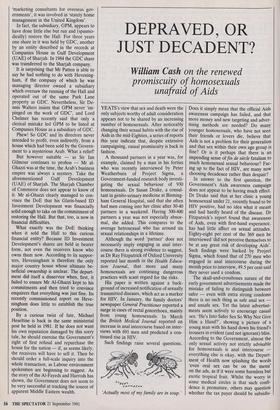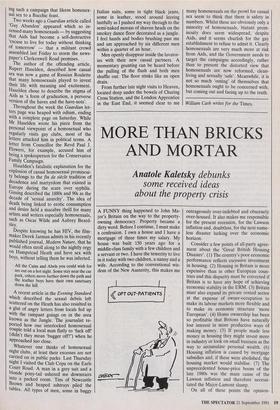DEPRAVED, OR JUST DECADENT?
William Cash on-the renewed
promiscuity of homosexuals unafraid of Aids
YEATS's view that sex and death were the only subjects worthy of adult consideration appears not to be shared by an increasing number of homosexuals. After noticeably changing their sexual habits with the rise of Aids in the mid-Eighties, a series of reports this year indicate that, despite extensive campaigning, casual promiscuity is back in fashion.
A thousand partners in a year was, for example, claimed by a man in his forties who was recently interviewed by Peter Weatherbum of Project Sigma, a Government-funded research body investi- gating the sexual behaviour of 930 homosexuals. Dr Susan Drake, a consul- tant in genito-urinary medicine at Birming- ham General Hospital, said that she often had men coming into her clinic after 30-40 partners in a weekend. Having 300-400 partners a year was not especially abnor- mal, she added. This compares to the average hetrosexual who has around six. sexual relationships in a lifetime.
Although the word 'partner' does not necessarily imply engaging in anal inter- course there is strong evidence to suggest, as Dr Ray Fitzpatrick of Oxford University reported last month in the Health Educa- tion Journal, that more and many homosexuals are continuing dangerous practices with scant regard for the risks.
His paper is written against a back- ground of increased notification of sexually transmitted diseases, which act as a marker for HIV. In January, the family doctors' newspaper General Practitioner reported a surge in cases of rectal gonorrhoea, mainly from young homosexuals. In March the British Medical Journal reported an increase in anal intercourse based on inter- views with 691 men and predicted a con- tinued rise in HIV.
Such findings raise several questions.
`Actually most of my family are in soup.' Does it simply mean that the official Aids awareness campaign has failed, and that more money and new targeting and adver- tising methods are needed? Do many younger homosexuals, who have not seen their friends or lovers die, believe that Aidsis not a problem for their generation and that sex within their own age group is fine? Or is it perhaps that there is an impending sense of fin de siecle fatalism to much homosexual sexual behaviour? Fac- ing up to the fact of HIV, are many now choosing decadence rather than despair?
In answer to the first question, the Government's Aids awareness campaign does not appear to be having much effect. Dr Drake said that at her clinic a young homosexual under 21, recently found to be HIV positive, had no idea what it meant and had hardly heard of the disease. Dr Fitzpatrick's report found that awareness of Aids, even with first-hand experience, has had little affect on sexual attitudes. Eighty-eight per cent of the 369 men he interviewed 'did not perceive themselves to be at any great risk of developing Aids'. Such findings were backed by Project Sigma, which found that of 270 men who engaged in anal intercourse during the month prior to interview, 49.5 per cent said they never used a condom.
The skull-and-crossbones nature of the early government advertisements made the mistake of failing to distinguish between safer — even with extra strong condoms there is no such thing as safe anal sex and unsafe sex. Yet the latest advertise- ments seem actively to encourage casual sex: `He's Into Safer Sex So Why Not Give Him a Hand?', showing a picture of a young man with his hand down his friend's trousers in evident (and not ignorant) bliss. According to the Government, almost the only sexual activity not strictly advisable for homosexuals is anal intercourse everything else is okay, with the Depart- ment of Health now splashing the words `even oral sex can be on the menu' on the ads, as if it were some harmless but exotic tropical fruit. Whilst the worry in some medical circles is that such confi- dence is premature, others may question whether the tax payer should be subsidis- ing such a campaign that likens homosex- ual sex to a Bacchic feast.
Two weeks ago a Guardian article called `Gay Abandon' appeared which so in- censed many homosexuals — by suggesting that Aids had become a self-destructive `excuse to live for today without thinking of tomorrow' — that a militant crowd assembled last Friday to storm the news- paper's Clerkenwell Road premises.
The author of the offending article, Rupert Haselden, described how casual sex was now a game of Russian Roulette that many homosexuals played to invest their life with meaning and excitement. Haselden chose to describe the stigma of Aids as 'a form of graduation: a perverse version of the haves and the have-nots'.
Throughout the week the Guardian let- ters page was heaped with odium, ending with a complete page on Saturday. While Mr Haselden wrote his piece from the personal viewpoint of a homosexual who regularly visits gay clubs, most of the letters attacked him in political terms. A letter from Councillor the Revd Paul J. Flowers, for example, accused him of being a spokesperson for the Conservative Family Campaign. Haselden's fatalistic explanation for the explosion of casual homosexual promiscui- ty belongs to the fin de siecle tradition of decadence and martyrdom that existed in Europe during the scare over syphilis. Gissing described the 1880s and 90s as the decade of 'sexual anarchy'. The idea of death being linked to erotic consumption and desire held a macabre thrill for many artists and writers especially homosexuals, such as Oscar Wilde and Aubrey Beard- sley.
Despite knowing he has HIV, the film- maker Derek Jarman admits in his recently published journal, Modern Nature, that he would often stroll along to the nightly orgy on Hampstead Heath and have sex with boys, without telling them he was infected.
All the CaMs and Abels you could wish for are out on a hot night. Some stay near the car park, others move further down the path and the leather boys have their own sanctuary down the hill.
A recent article in the Evening Standard which described the sexual debris left scattered on the Heath has also resulted in a glut of angry letters from locals fed up with the rampant goings on in the area known as the Jungle. The journalist re- ported how one interlocked homosexual couple told a local man flatly to 'fuck off' (didn't they mean 'bugger off?') when he approached too close.
Whatever one thinks of homosexual night clubs, at least their excesses are not carried on in public parks. Last Thursday night I visited the Club Copa on the Earls Court Road. A man in a grey suit and a blonde pony-tail ushered me downstairs into a packed room. Tins of Newcastle Brown and heaped ashtrays piled the tables. All types of men, some in baggy Italian suits, some in tight black jeans, some in leather, stood around leering lustfully as I pushed my way through to the semi-naked morass of shaven heads on the smokey dance floor decorated as a jungle. I feel hands and bodies brushing past me and am approached by six different men within a quarter of an hour.
Men openly disappear inside the lavator- ies with their new casual partners. A momentary grunting can be heard before the pulling of the flush and both men shuffle out The floor stinks like an open drain.
From further late night visits to Heaven, located deep under the bowels of Charing Cross Station, and the London Apprentice in the 'East End, it seemed clear to me many homosexuals on the prowl for casual sex seem to think that there is safety in numbers. Whilst these are obviously only a minority of homosexuals, blatant prom- iscuity does seem widespread, despite Aids, and it seems churlish for the gay establishment to refuse to admit it. Clearly homosexuals are very much more at risk from Aids, and the Government needs to target the campaigns accordingly, rather than to present the distorted view that homosexuals are now reformed, clean- living and sexually 'safe'. Meanwhile, it is not so much 'outing' of themselves that homosexuals ought to be concerned with, but coming out and facing up to the truth.
William Cash writes for the Times.



























































 Previous page
Previous page